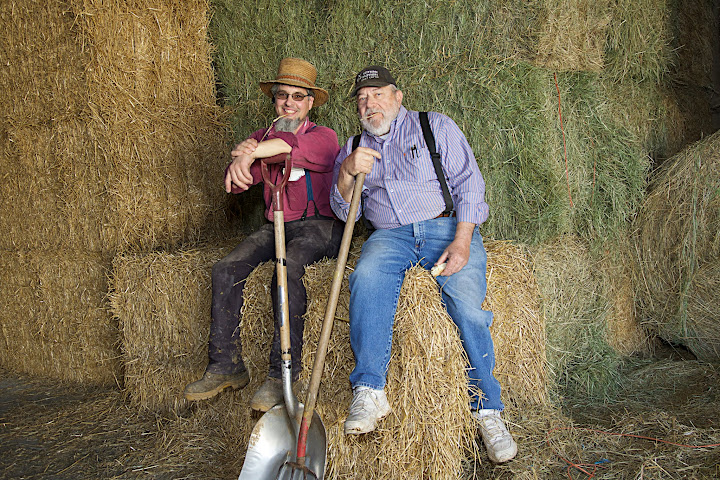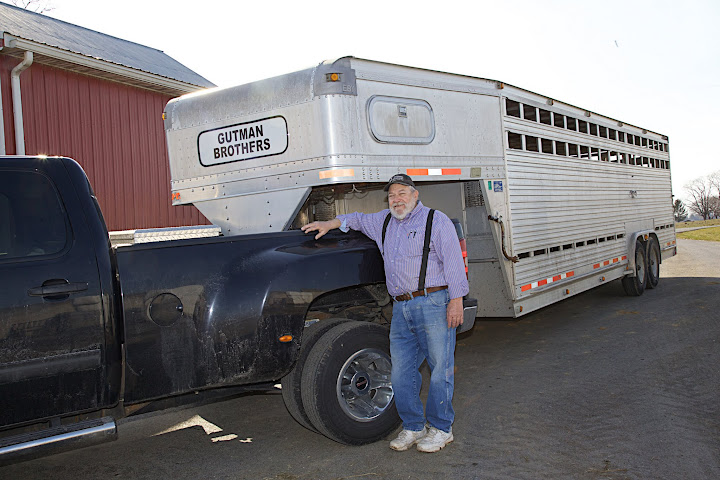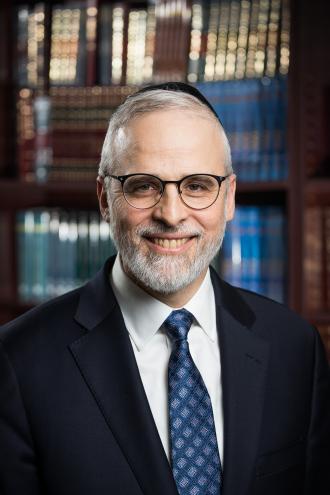They spend the bulk of their waking hours on the family cattle farms in Pennsylvania, but the Gutmans would never consider living outside an established Torah hub — a lesson in priorities as deeply ingrained as the family’s multigenerational affinity for cattle dealing. Four generations after Max Gutman first found a foothold in York County, his uncompromising convictions still drive the family business.
Abe Gutman was still a kid when he realized how much time his father spent commuting from their Baltimore home to his livestock farm in Pennsylvania. “Why don’t we move out to the farm already?” he asked.
He’d never forget Ernst Gutman’s response. “You’ve got to live in a makom Torah,” the German immigrant told his son.
The Gutman family continues to do that. Just as Abe’s father and grandfather managed the long commute when they started catering to America’s dairymen in 1942, Abe and his sons hit the road every morning for their daily trip from Baltimore’s Torah-observant hub to the pastoral farmland of Pennsylvania.
Identical twins, Binyomin and Doniel, started helping out their father at age ten, and are now seasoned cattle dealers. All three make a daily commute of about an hour to the family’s four farms in York County, Pennsylvania, totaling 450 acres. Then there’s their Lancaster County farm, just “down the road a piece” — a 50-minute drive.
The Gutmans sell about 25,000–30,000 heads of cattle per year, and milk between 200–500 cows every day, the number fluctuating with the day’s sales and the amount of calves that are born. The turnover is constant, with hundreds of cows constantly being traded and transported. But Ernst Gutman’s dictum remains as powerful today as it was when it was first spoken. “As much as we feel at home on the farm, we would never be here for Shabbos,” says Doniel. “You just don’t mix those two. You go a hundred miles an hour every day, every week, and then when Shabbos comes, it’s like a switch, where nothing else matters. And then you make Havdalah and it matters a lot again. You’re back on your phone, back on the job.”
Winds of Change
The Gutmans’ York County farm is just a 50-minute ride from Baltimore, but it feels like a different world. The air is country-fresh, and the ambiance is different, too. Photographer Esky Cook and I are greeted by Abe, whose work attire includes a plaid shirt, large insulated vest, faded jeans, suspenders, work boots, and a baseball cap. Amid the symphony of chirping birds and ear-tagged mooing cows, he reassures us that we can safely leave our valuables in the car.
“This is my Park Avenue office!” Abe announces, holding open his office door. The interior is dusty, as to be expected on a farm, and the decor a bit outdated — a beige linoleum floor; assorted sizes of green, rusty steel cabinets; an old-fashioned pencil sharpener on the wall; a black refrigerator covered with magnets; a small cabinet with drawers marked with “Meat” and “Dairy” signs; and an old wooden desk graced by a huge copy machine, piles of paperwork, and a corded telephone.
As we walk to the adjacent feeding barn, built by Abe’s sons, he tells us that as early as the mid-1960s, he could see indications of change in the industry. “The white people no longer want to work in York County — the only help I can get is from Mexicans,” he says, before we enter the barn to find one of the workers administering sonograms to determine if the cows are pregnant.
Four employees currently work on the farm here in York County; eight work on the Gutmans’ Lancaster farm. “As early as the 70s, we stopped milking our cattle in York County and opened up the Lancaster facility in 2005. In Lancaster County, you have the Mennonites, the Amish, and the Mexicans who are willing and eager to work. When the cows are ready to give birth, they’re sent to our Lancaster County farms, where there’s no shortage of skilled hands available to help them out.”
That’s not the only change he’s seen over the years. “My father sold cows to farmers and financed them, charging them interest,” continues Abe. “Back then, you never heard the word ‘bankruptcy’ in the countryside. If you signed a note saying that you owed somebody money and then you couldn’t pay, you called and said, ‘I’m short this month and I can’t pay. Can we work it out somehow?’ But I saw in the mid-60s that the country was changing.”
One incident still stands out as a turning point. Abe once accompanied his grandfather to collect money from a farmer. “This farmer was holding the handle of a really sharp cutting knife,” he remembers. “He kept twirling it on the tip on his finger, as if to threaten my grandfather. At that moment, I told myself that if I ever take over this business, I’m not going to do these financing deals.”
Abe also picked up on another troubling trend. “I noticed that good, upright farmers were separating from their wives. I realized that people in general were changing; the morals in the country were starting to go down.”
Reading the signs of the changing market, Abe transitioned from a credit-based arrangement to a wholesale business. The scale of his dealings changed too. “Instead of selling two to ten cows to an individual farmer, we now sell truckloads. We even get orders from people in Turkey and Saudi Arabia — they don’t know that they’re buying from Jews. If they did, they probably wouldn’t buy. For these clients, we use a middleman, who gets us orders for shiploads of cattle — up to 3,500 head of cattle each.
“We send a lot of cows to Puerto Rico by ship, and to Mexico by plane. When we do send cattle by plane, the bigger airports like JFK, have planes big enough to carry as many as 140 cows. They gut out older passenger planes, remove the seats, and line the entire thing with plastic. Then they are put in pens — each holds about four or five cows — that are gated off so they can’t bump into one another during the flight.”
Just a Guest Here
Though the Gutman family has been dealing with cattle since the 1700s, Abe’s father Ernst took a roundabout route to the business after his arrival in America in 1938. In order to keep Shabbos, he worked on commission for the Fuller Brush Company. Then he went into the egg business, and then the chicken business, until he decided to go into the cattle business.
“In 1941, my father arranged for his parents to escape from the Nazis and travel to America,” says Abe. “He and his father, my Opa Max, decided to go into the cattle business together. Not knowing the difference between one cow and the next, they bought a cow, put it on a truck, peddled it to some farmers and made some money, so they decided to continue buying more. Because my grandfather couldn’t speak any English, my father bought a farm in York County, Pennsylvania, where the farmers spoke Pennsylvania Dutch — a language similar to German. This way my Opa could be involved in the business.”
When Ernst started seeing success, his lawyer advised him to incorporate. He changed his business name from E. Gutman and Co. to Logoor, Inc. Since his father really believed that he was only passing through the United States on his way to Eretz Yisrael, where he eventually planned to settle, he renamed his company based on the same sentiment expressed in the pasuk in Chumash Bereishis, “Rak lagur (which he spelled ‘logoor’).” Similarly, although he had hakaras hatov for America, and celebrated his anniversary of coming to America with a family barbeque at the farm every year, he would say, “I’m only a guest here, I’m only passing through.” As a guest he felt he didn’t have a right to determine the country’s leadership, so he never voted.
The same priorities still drive the business two generations later. “Our frumkeit runs our business, it makes it go,” Doniel says. “I would say that 90 percent of what we do, doesn’t make sense on paper. We are here as robots. Who knows what’s going to come about because of the next phone call? A phone call changes everything — it can mean a new sale. If you go through a time where you’re not spiritually connected, this business can be very stressful. But if you’re connected, you understand what will be, will be, and what will happen, will happen. Are you kidding? I’m on vacation every day. I just call it work. It’s the best job in the world.”
“My father would always make the comment, ‘it’s not our smarts that make us successful,’ ” Binyomin says. “When hearing this so many times at a young age, you start to wonder… Are we that dumb? But the deeper meaning of what he was saying and what we absolutely live by today is this: When a person feels that it’s their own doing that makes them successful, it’s not only foolish but also a lack of hakaras hatov to Hashem and a misunderstanding of how the world works.”
Lingering Lessons
Ernst Gutman’s convictions were molded by his father Max, a German Jew with ironclad commitment to his ideals. “My grandfather was very shtark in his Yiddishkeit,” Abe shares with us as we walk through the property. “He davened with a minyan every morning before work, and even though he’d come home very late at night — sometimes not until 11 p.m. or midnight — he wouldn’t eat until he davened Maariv. I took that upon myself, too.”
Even on the farm, Max wore a gray hat or a smaller cloth hat, and dressed like a Jewish man; everybody in the countryside knew that he was Jewish. “He said that a Yid has got to look like a Yid,” Abe remembers.
“My father was the same way — if he made a commitment, there was no budging him,” Abe says. “At one point our lawyers advised us to hold a formal meeting once a year, to go through the figures and set priorities for the business. He figured the hour-long commute to the farm would be a good time to hold the meeting. But as soon as I tried getting the discussion going, my father said, ‘Wait a minute. Let me just catch up on my daf yomi.’ Half-an-hour later, he closed his Gemara. ‘Ready for the meeting?’ I asked. His response: ‘Let me just finish being maavir sedrah.’”
The scenario repeated itself year after year — for 40 years. “We never did have our meeting,” Abe says ruefully. “But my father made his priorities very, very clear.”
Those lessons still linger for a new generation of Gutmans. “Business is a lot less stressful when I remind myself of my father and grandfather’s main lessons,” Binyomin says. “First, deals are made in shul — through davening. Second, you can learn more about bitachon and siyata d’Shmaya at the farm than you can in yeshivah. Third is the importance of Shabbos — even though the busiest day of our industry is Shabbos. Fourth, always make a Kiddush Hashem, or as they put it, ‘kill your competition with a smile.’
“And last is the importance of tzedakah. If you find it too hard to part with your money, HaKadosh Baruch Hu will just hand over your parnassah to somebody else who’s happier to give. I think it’s largely because of those core values that Hashem has allowed us to grow this business to one of the largest dairy cattle dealers in the country."
No Questions
Abe’s brothers, Josh and Manny z”l, were also part of the Gutman cattle business. Today, Josh (and Marion) Gutman’s son, Eli, carries on the family tradition with his own cattle dealing business, Marc Gutman Dairy Cattle. It is also located in Lancaster County and they enjoy an amiable relationship. Abe’s two daughters and a third son chose not to go into the family business. Time will tell if his grandchildren find their calling at the farm.
The newer generation of Gutmans, twins Doniel and Binyomin, dress just like their father and spend plenty of time dealing with the nitty-gritty details of the livestock care. But they’ve also integrated cutting-edge communications into the sales process. “We try to buy cattle every day,” says Doniel, before showing us a pile of a homemade feed blend of corn, triticale, and hay, that he is about to spread before the cattle with his tractor. “We do a lot of business by texting. If we trust the sellers, we let them ship the cattle here and we don’t see them until they get here. Sometimes we see the cattle on video.
“In the past, we would never let people ship cattle to us, sight unseen — we would have to see the cattle and hondle with the owners,” Abe says, before calling over Doniel to discuss the logistics of moving the supersized plastic bags of feed from the York County farm field to the Lancaster County feeding farm. “One of us used to have to look at 100 percent of the cattle we bought. Then, we were looking at 90 percent of them. Today, things have changed. One of us probably looks at 20 percent of the cattle that we buy.” For the most part, the Gutmans rely on trusted buyers who send them cows anywhere from Maine down to Virginia, but also from Texas, California, and elsewhere around the country. Most of those cattle get resold within a week.
The business relationship is also based on mutual trust and respect. “If one of us goes out on the road and sees a bunch of cattle and feels that they can be bought at the right price, we never question each other,” Abe says. “How many cows should we buy and other details — that’s left up to each of us. Some days, the three of us can be on the road and buy 100 head of cattle each.”
Actually, Abe and his sons trust each other so implicitly and get along so well, the only difference of opinion that he admits to involves the ideal number of cattle on the farms. “I believe you shouldn’t overcrowd the facility,” notes Abe. “My boys feel if there's another inch, you can put a cow there.”
No Golf Course for Me
Abe feels very satisfied knowing that he’s already given the farm to his sons. “Hopefully, they’ll continue to have hatzlachah. In my old age, I’ll always have a place to go to. Some people get older and want to move to Florida and go to the golf course. I’m not interested in that.”
For now, he still travels to the York County farm to take care of the machinery and pitches in where needed. Binyomin and Doniel spend the bulk of their time either at the York County farm or on the road, buying or selling cattle. Their typical day includes waking up around 6 a.m., going to shul for Shacharis, and heading out between 8 a.m. and 9 a.m. to the farm. They return home between 9 p.m. and 11 p.m. every single day, except for Shabbos, with a lighter schedule on Erev Shabbos.
On our way to the silage pit, where whole corn is ground up for cattle feed, I ask Doniel what it’s like working with his father. “Well, I’ve been helping out since I was ten years old,” he says. “It’s a lot of fun, except that we don’t get paid.”
Abe quips back, “The reason I don’t pay him is because he’ll use the money to go into competition with me!”
The Lancaster County farm, which we visit next, is managed by Henry, a personable, hard-working Amish local. He obligingly shares his vast knowledge, ranging from farm statistics to the pros of raw milk over store-bought milk. This farm, he said, can hold up to 1,200 head of cattle, but only 520 cows — 430 milking cows and 90 pregnant cows — are there during our visit, due to a recent large sale. He expected 1,700 gallons of milk to be produced over the course of the day, 98 percent of which will go to the bottling plant. The other 2 percent is waste, due to colostrum or antibiotics, and it goes into a different tank to be pasteurized and fed to the calves.
Henry has a surprise to show us: a brand new calf, born just two minutes ago. I watched in awe as the mother licks her newborn and gently prods him to stand up on his own. A separate pen for calves is just a short drive away on yet a third farm, just down the road from local Amish homes and a one-room schoolhouse.
Providence on the Road
Abe says he could write a book detailing the unusual experiences accrued over his decades in the business. “Once I was with my father in West Virginia, buying a herd of cows. My father was hondling with the farmer to buy it cheaper,” recalls Abe. “This farmer had a big fat hog running around in the field and he told my father, ‘I’ll tell you what, if you want, I’ll throw the hog in the deal.’ Later we asked a sh’eilah and were told we could have taken it, but my father just couldn't bring himself to take the hog.”
Then there’s the story about a kindness that paid itself forward. Soon after Ernst had gotten his stride in the business, a relative living in Florida, also a cattle dealer, asked him for help getting his own footing. Ernst was happy to help by buying cattle up North and sending it down to Florida. No matter that the lack of interstate highways meant a 12–15 hour truck drive just to South Carolina, where Ernst paid someone to feed and care for the cattle so it could rest up for the remainder of the trip.
“Farmers in South Carolina were just getting into the dairy cattle business at the time,” Abe says. “They were curious about all those cows, and wondered who was sending them. Soon enough, the orders started coming in. In the end, South Carolina became a bigger market for my father than Florida. You can see, if you look closely, the Yad Hashem.
“If you don’t have siyata d’Shmaya, all your smarts mean nothing,” Abe continues. “Take the time a blizzard hit west Texas and New Mexico. My boys sell a lot of cattle in Texas. Normally, a farmer from that area would order two loads of cattle at a time. When that blizzard hit them, people weren’t prepared for it down South, and their cattle died. All of a sudden, customers came out of the woodwork, ordering cattle like crazy.”
Yet another story involves the recent industry switch in popularity from Holstein to Jersey cattle. Since Holsteins don’t have the same components — like butterfat — that Jerseys do, Jerseys and Holstein/Jersey crossbreds have gained popularity.
“At one time, those crossbred calves were hardly worth anything,” says Abe, “but about 15 years ago, right as the transition was beginning, we got an order from a big dairy in Texas that was switching their cattle from Holstein to Jersey. They told us to get a hold of all the crossbred cows that we could, and they would buy from us. So for several years, we had almost a corner on the market and had no competition with the sales — we were a couple years ahead of our competition, until more and more people got interested in them. It all goes back to siyata d’Shmaya!”
Abe’s most memorable order involved a sale of a planeload of cattle to a client in Iran. The order came in 1979, just days before over 50 US citizens and diplomats were captured and held hostage for 444 days, by an angry mob of “Imam’s Disciples” who laid siege to the American Embassy in Teheran. It was not the first time Abe dealt with buyers in that country and, as usual, he demanded payment before the cattle would leave his farm.
“This time, they sent down someone that I had never met, an Iranian from New Jersey,” Abe reminisces. “Just before I got ready to load the 80 heads of cattle, I told him that I would like my check.”
The man had a briefcase with him. He tapped it and said, “I have your check in here, but my boss told me I’m supposed to pay when we get them to the final quarantine.”
So Abe trucked the cattle to a farm very close to the Harrisburg airport. With the cows safely in quarantine, he asked again for his check.
“My boss called me and said not to give you the money until they’re on the airplane,” the Iranian said. Abe decided to wait it out. “We loaded the cows on Erev Shabbos and brought them to the airport,” he says. “At the airport, we backed our truck up to the airplane and unloaded our cattle onto the airplane. Then I baked up our truck in front of that airplane and locked all the doors. I made it clear I wouldn’t let that plane take off unless I get my check. Finally the Iranian gave me a check — but for half the amount of what the cattle was sold for! I decided to take the chance.”
Over that weekend, American hostages were taken in Iran. “I figured that was the end of my money,” Abe says. “But about three weeks later, I get a letter from Iran with the check with the rest of the money — we were paid in full! The two other, non-Jewish cattle dealers who sold to the same clients never got a cent and went bankrupt after that. They let their cattle fly to Iran without any payment, I let ours go with half-payment and just figured that we lost the rest.
“Is there any logic there, other than Someone Up There looking out for me?"
Good ’Ol Dirt
The Gutmans’ farms aren’t the only remaining testaments to their grandfather’s pioneering spirit. Baltimore’s Jewish community still bears the imprints of his ideals: He opened up his home to house the first Agudah minyan in Baltimore and was instrumental in bringing chalav Yisrael milk to the city.
Long after his children took over the farm, he retained his deep connection to the family business he’d transplanted from Germany to American soil. “The last Sunday that my Opa was alive,” recalls Doniel, “everyone was asking, ‘what can we do for him?’ I remember that my father brought him up here, to the farm. That’s all he wanted to do. He got out of the car, reached down, and picked up the dirt. He said, ‘Good ‘ol Pennsylvania dirt.’ You don’t teach that. You can’t teach someone to love what they do.
“At that point in his life, that’s what he wanted to do. We brought him into the barn in a wheelchair and we sorted cattle, took the gate off for him so he was able to see. That’s all he wanted.”
Doniel takes in the view — the little office, the tractors, the sheds and their bovine inhabitants. For us, it’s a novelty. For him, it’s a calling and a heritage, fine-tuned by generations of experience and shaped by Providential encounters in the least likely places.
“Sometimes I fly with my family to some vacation spot or another,” he confesses, “and as soon as the plane lands, the first thing I want to do is get back on and fly back to the farm. When you live and breathe this, it’s not a job. It’s our way of life and we wouldn’t want it any different.”
~~~~~~~~~~~~~~~~~~~
SIDEBAR
Range of Questions
One particular challenge for the Gutmans, who might very well be today’s only frum cattle dealers, is that there are very few rabbanim who are qualified to answer their agricultural halachic queries, unlike decades ago, when agriculture was more prevalent among observant Jews.
Abe’s father Ernst once asked a sh’eilah regarding his non-Jewish employees planting a crop in his field just a few days before Pesach. Since it would have sprouted chometz on Pesach, he was concerned about owning chometz on Pesach. Other sh’eilos have concerned cutting down fruit trees on the farm, in order to do construction; the kind of feed that is permissible for cattle over Pesach (since their standard fare is a wheat/corn/barley mixture which cannot be fed on Pesach — the feed companies, by the way, know the Gutmans’ “holiday mixture”); and more recently, if the new crop, triticale — a cross between wheat and rye — is prohibited to plant because it is kelayim (actually, Rav Moshe Heinemann paskened for the Gutmans that if they lived in Eretz Yisrael they cannot plant it, in chutz l’Aretz they can).
Abe also encountered a halachic query regarding the proper handling of a firstborn male calf. His father used to make their non-Jewish farm neighbor a partner in their business through a yearly $100 dividend, which made it halachically permissible for the Gutmans to sell the calves. Abe never realized that his father made a shtar with this neighbor. It was only when the non-Jewish father passed away, and Abe told the son that he wanted to carry out the same procedure with him as their fathers had, “What about that contract that my father signed with your father? Do you want me to return that to you?” the neighbor offered. That casual offer was Abe’s Providential clue that the dividend would be insufficient without the issuance of an updated shtar.
~~~~~~~~~~~~~~~~













































































